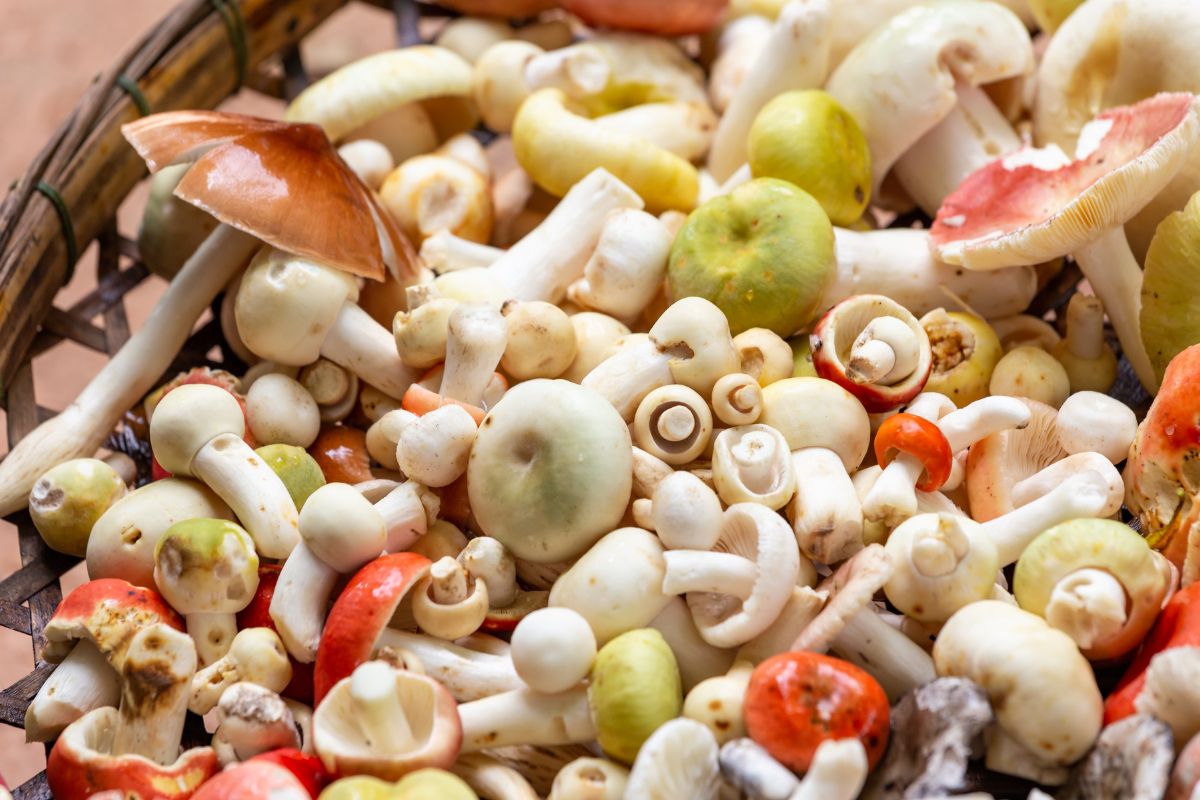Mushrooms are not only a delicious and versatile ingredient in the culinary world, but they also offer numerous health benefits for women. These fungi, which come in various shapes, sizes, and flavors, are packed with nutrients and antioxidants that can help improve overall health and well-being. Research has shown that incorporating mushrooms into a balanced diet can provide several advantages for women’s health, including cancer prevention, immune system support, and improved bone health.
One noteworthy benefit of consuming mushrooms is their potential to reduce the risk of breast cancer. A case-control study on the dietary intake of mushrooms and breast cancer risk among Korean women found an association between higher mushroom consumption and a lower risk of breast cancer, although further research is needed to confirm this relationship link. Additionally, mushroom farming and production can empower women economically. A study in Uganda showed that mushroom production is a profitable enterprise for women, as the fast maturity and market availability of mushrooms provide a stable income link.
Incorporating mushrooms into one’s diet not only promotes good health but also supports the economic development of women across the globe. As research around the health benefits and economic impact of mushrooms continues to progress, it becomes increasingly clear that these fungi hold great potential for improving women’s lives in various ways.
The Relationship Between Mushrooms and Women’s Health
Table of Contents
Mushrooms have long been considered a nutritious and versatile food option. In recent years, various studies have highlighted the potential health benefits of mushroom consumption, particularly for women. The diverse range of nutrients and active compounds found in mushrooms can contribute to a variety of health improvements for women of all ages.
One of the significant findings relates to the reduction of breast cancer risk. A study focusing on the intake of mushrooms and its connection to breast cancer found that high mushroom consumption might be associated with a lower risk for breast cancers among premenopausal women 1. This promising result indicates that incorporating mushrooms into one’s diet could play a role in decreasing this prevalent health concern among women.
Mushrooms are also known to contain essential nutrients that can support cognitive performance. A cross-sectional study examining the relationship between mushrooms and cognitive performance among middle-aged and older adults revealed an interesting association 2. While sex stratification analysis was conducted, the study’s results are still applicable to women who aim to maintain cognitive health as they age.
Furthermore, mushrooms can be seamlessly integrated into various meal plans to add a new dimension of flavor and nutrition. For instance, a study explored consumer preferences for burgers with a traditional recipe or with mushroom addition, and found interesting associations among consumers 3. This serves as an example of how mushrooms can be incorporated into a balanced diet without compromising taste or dietary preferences.
In conclusion, the relationship between mushrooms and women’s health is undoubtedly an area that warrants further exploration. The existing studies suggest that consuming mushrooms as a part of a balanced diet may offer specific health benefits for women, such as reducing the risk of breast cancer and supporting cognitive function.
Nutrition Profile of Mushrooms
| Nutrient | Amount Per 100g (Raw) | % Daily Value (DV) |
|---|---|---|
| Calories | 22 | |
| Protein | 3.1 grams | 6% |
| Carbohydrates | 3.3 grams | 1% |
| Dietary Fiber | 1 gram | 4% |
| Sugars | 1.7 grams | |
| Fat | 0.3 grams | 0% |
| Vitamin D | Varies by type | Varies |
| Vitamin B2 (Riboflavin) | 0.4 milligrams | 23% |
| Vitamin B3 (Niacin) | 3.6 milligrams | 18% |
| Vitamin B5 (Pantothenic Acid) | 1.5 milligrams | 15% |
| Vitamin B6 (Pyridoxine) | 0.1 milligrams | 6% |
| Folate (Vitamin B9) | 16 micrograms | 4% |
| Vitamin C | 2.1 milligrams | 4% |
| Vitamin K | Varies by type | Varies |
| Calcium | 2 milligrams | 0% |
| Iron | 0.3 milligrams | 2% |
| Magnesium | 9 milligrams | 2% |
| Phosphorus | 86 milligrams | 9% |
| Potassium | 318 milligrams | 9% |
| Selenium | 5.7 micrograms | 8% |
| Zinc | 0.5 milligrams | 3% |
Mushrooms are a functional food with numerous health benefits for women. In this section, we will discuss their impressive nutrition profile that consists of essential vitamins, minerals, and bioactive compounds.
Low Calories and Fat Content
Mushrooms are an excellent choice for those who are mindful of their calorie and fat intake. They are low in both calories and fat, making them a healthy addition to any diet. For example, an 84-g serving of white button mushrooms contains only 20 calories and 0.2g of fat. This makes mushrooms a suitable food option for weight management and overall health.
Vitamins and Minerals
Mushrooms are a good source of essential vitamins and minerals that support various bodily functions. Some of the notable vitamins and minerals found in mushrooms are:
- Vitamin D: A unique feature of mushrooms is their ability to produce vitamin D when exposed to sunlight or ultraviolet (UV) light. Vitamin D is critical for bone health and calcium absorption.
- B vitamins: Mushrooms are particularly rich in vitamin B6, riboflavin, niacin, and pantothenic acid. These B vitamins are essential for maintaining a healthy nervous system, producing energy from the food we consume, and supporting healthy skin and hair.
- Vitamin C: Some varieties of mushrooms, such as the shiitake, contain vitamin C, which is known for its immune-boosting and antioxidant properties.
- Potassium: This essential mineral helps regulate blood pressure and fluid balance in the body. Mushrooms are a good source of potassium, with some species having even higher levels than bananas.
- Iron and Calcium: While not as abundant as other nutrients, mushrooms still provide some amounts of iron and calcium, which are crucial for maintaining healthy blood and strong bones, respectively.
- Selenium: Mushrooms are one of the few plant-based sources of this essential trace mineral, which contributes to the proper functioning of the immune system and thyroid gland.
In addition to vitamins and minerals, mushrooms also contain protein and fiber, making them a nutritious and well-rounded food choice. Their bioactive compounds, such as beta-glucans and polyphenols, have been linked to various health benefits, including immune system support and potential cancer prevention. Incorporating mushrooms into a balanced diet can provide ample nutrition and overall health benefits for women.
Types of Mushrooms and Their Benefits
Shiitake Mushrooms
Shiitake mushrooms are a popular variety of edible mushrooms, known for their rich, savory flavor. They contain essential nutrients, such as vitamins B2 and D, and minerals like zinc, copper, and manganese. Shiitake mushrooms also provide immune-boosting properties, which can be beneficial for women’s health as it may help fight off infections and support overall immune function.
Maitake Mushrooms
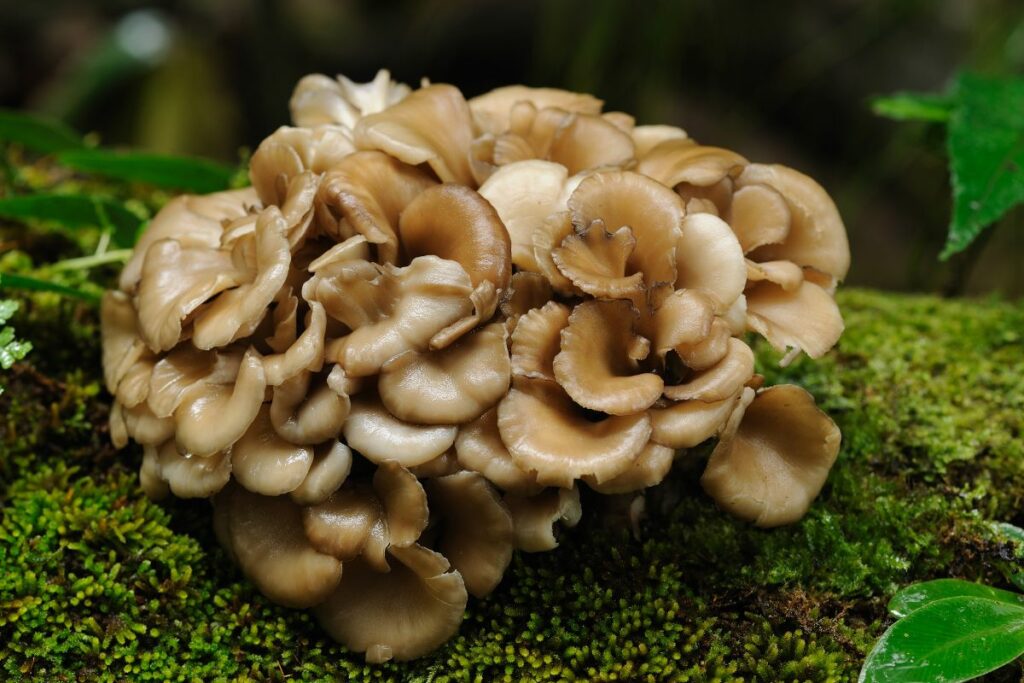
Maitake mushrooms, also known as “hen of the woods,” have been used in traditional medicine for centuries. They contain beta-glucans, which are known for their immune-enhancing effects. Maitake mushrooms can help women maintain a healthy immune system and may even have a positive impact on blood sugar levels, making them a good dietary option for those with diabetes.
Reishi Mushrooms

Reishi mushrooms are well-known for their adaptogenic properties, which means they can help the body cope with stress and maintain overall balance. The extract from reishi mushrooms has been linked to improved sleep quality and reduced anxiety, both of which can be particularly important for women. Reishi mushrooms also contain immune-boosting compounds, helping to support overall health.
Cordyceps Mushrooms

Cordyceps sinensis, also known as caterpillar fungus, is a unique and highly valued medicinal mushroom. It’s known for its ability to increase energy levels and improve athletic performance. Women can benefit from cordyceps mushrooms, as they may help reduce fatigue and improve physical endurance, making it easier to maintain an active and healthy lifestyle.
Other Mushroom Varieties
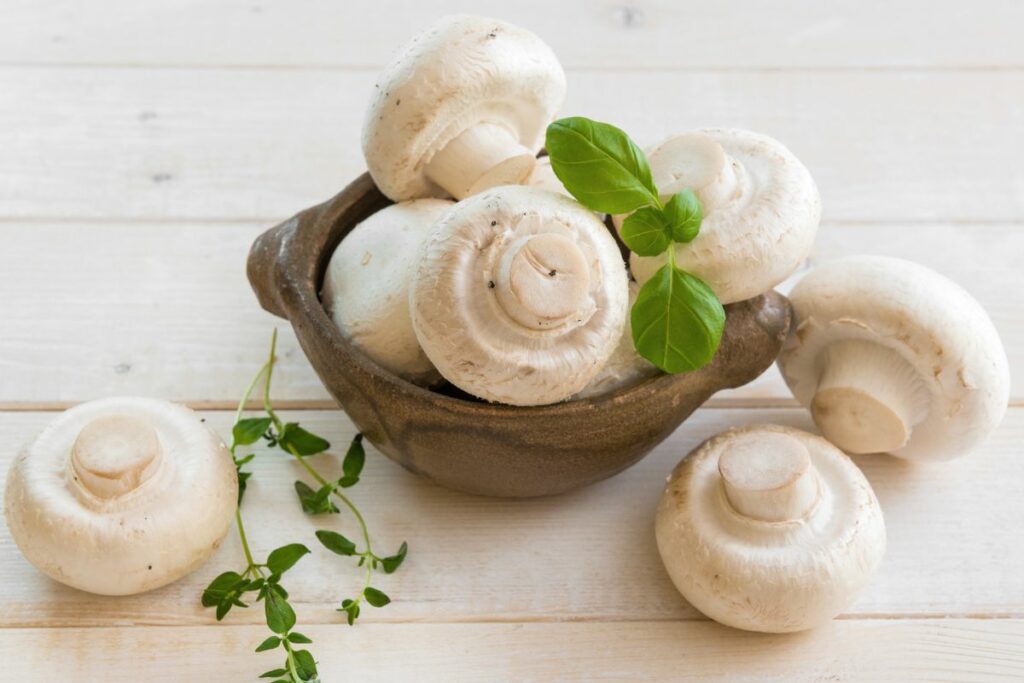
There are many other edible mushroom varieties, each with their unique flavor profiles and health benefits. Some of these include:
- Button mushrooms: Rich in vitamin D and potassium, these mushrooms are also an excellent source of dietary fiber.
- Oyster mushrooms: High in protein and essential amino acids, oyster mushrooms are an excellent addition to a vegetarian or vegan diet.
- Chanterelle mushrooms: Known for their high levels of vitamin C and unique flavor, chanterelles can boost the immune system and overall well-being.
- Cremini and Portobello mushrooms: Both belonging to the same species, these mushrooms are packed with nutrients and can easily replace meat in various recipes due to their hearty texture.
In conclusion, incorporating a variety of mushrooms into one’s diet can provide numerous health benefits for women, from immune support to stress relief. It’s important to choose high-quality, fresh mushrooms, and incorporate them into a balanced diet for optimal results.
Immune System Support
Mushrooms, particularly shiitake and maitake varieties, have long been valued for their potential benefits to the immune system. These types of mushrooms contain compounds, such as polysaccharides, which may play a significant role in supporting immune health. When incorporated into a balanced diet, mushrooms could provide women with additional support for their immune system.
Shiitake mushrooms, for example, have been shown to possess immunomodulatory properties. A study highlighted shiitake extracts’ potential benefits for women receiving endocrine therapy for breast cancer. The mushroom extract contributed to enhancing the immune responses necessary for healthy recovery.
Maitake mushrooms also have promising effects on the immune system. These mushrooms contain a type of polysaccharide called beta-glucans that is known for its immune-enhancing properties. Preliminary research has shown that maitake extracts can stimulate immune cells, supporting the immune system’s defense mechanisms.
Moreover, incorporating mushrooms into a diet can contribute to overall health and well-being. A review on mushroom production emphasized that mushrooms are a good source of protein, essential amino acids, vitamins, and minerals, which all play integral roles in the immune system.
In summary, incorporating shiitake and maitake mushrooms into a diet can provide women with valuable immune system support. These mushrooms contain beneficial compounds, including polysaccharides like beta-glucans, which can help maintain and enhance immune health.
Mushrooms and Bone Health
| Benefit | Description |
|---|---|
| Vitamin D | Some mushrooms, like shiitake and maitake, can produce vitamin D when exposed to sunlight or UV light. Adequate vitamin D is essential for calcium absorption and bone health. |
| Calcium Absorption Support | Mushrooms are a source of vitamin D, which helps the body absorb calcium from the diet. Calcium is a key mineral for maintaining bone density. |
| Selenium Content | Mushrooms contain selenium, a trace mineral that may contribute to bone health by reducing oxidative stress and inflammation. |
| Antioxidant Properties | Some mushrooms, including shiitake and reishi, are rich in antioxidants that may help protect bone cells from damage caused by free radicals. |
| Anti-Inflammatory Effects | Certain mushroom varieties have anti-inflammatory properties that could potentially benefit women with conditions like osteoarthritis, which can affect bone health. |
| Weight Management | Including mushrooms in a balanced diet can help with weight management, which is important for overall bone health. Maintaining a healthy weight reduces the risk of osteoporosis. |
| Bone Density Support | While not a direct source of calcium, mushrooms may play a role in maintaining bone density through their nutrient content and potential anti-inflammatory effects. |
Mushrooms have several benefits for women’s health, particularly in the area of bone health. These nutrient-rich fungi contain essential vitamins and minerals for promoting strong and healthy bones, including vitamin D and calcium.
One of the critical roles of vitamin D is to support the absorption of calcium, which is necessary for bone growth and remodeling. Studies show that consumption of vitamin D2 enhanced mushrooms is associated with improved bone health. In addition, vitamin D2 from light-exposed edible mushrooms has been found to be safe, bioavailable, and effective in supporting bone growth in rats, suggesting potential benefits for human bone health as well.
Mushroom extracts also exhibit potential benefits for maintaining healthy bones by decreasing bone resorption and improving bone formation. This effect can be especially helpful for women at risk of developing osteoporosis, a condition where bones become weak and more prone to fractures.
Furthermore, specific edible mushrooms, such as Ganoderma lucidum, have shown potential prebiotic effects and positively impacted bone health in both healthy and osteopenic women. This suggests that incorporating mushrooms into the diet could provide additional health benefits to the gut microbiota and, subsequently, improve bone strength.
Incorporating mushrooms into a healthy diet can be a great way for women to reap the benefits of these vitamin-rich fungi and promote overall bone health. Ensuring an adequate intake of both vitamin D and calcium is essential for women’s health, and consumption of mushrooms can be an effective strategy to achieve that goal.
Impact on Heart and Blood Pressure
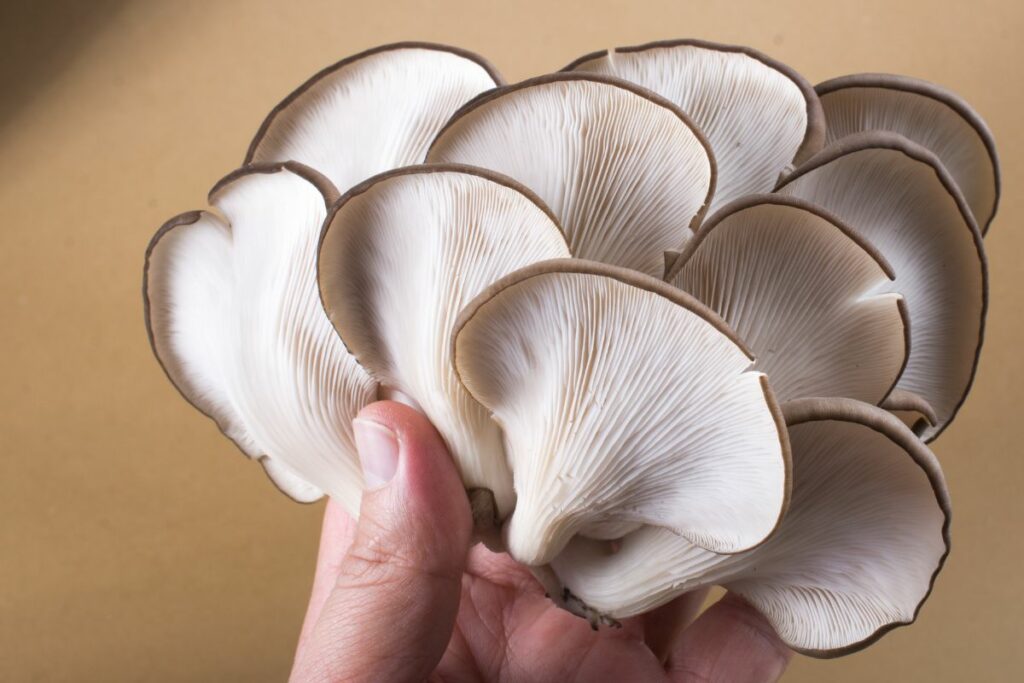
Mushrooms have been associated with a variety of health benefits for women, specifically regarding heart health and blood pressure. Regular consumption of mushrooms may contribute to lower blood pressure levels in both men and women1. Several bioactive constituents have been identified in mushrooms, which may have a significant impact on heart health and blood pressure regulation2.
One key factor linking mushrooms to improved heart health is the ability to reduce cholesterol levels. Mushrooms are a great alternative to red meat, as they contain fewer calories and saturated fats, helping lower cholesterol in the body3. Replacing red meat with mushrooms in meals can positively affect cholesterol levels and contribute to overall heart health.
In addition to lowering cholesterol, mushroom consumption may lead to reduced blood pressure. Studies show that the presence of certain compounds like gamma-aminobutyric acid (GABA) in mushrooms can result in lower systolic and diastolic blood pressure2. Regulating blood pressure is crucial for maintaining heart health and reducing the risk of cardiovascular diseases.
In conclusion, incorporating mushrooms into a woman’s diet can offer several potential benefits for heart health and blood pressure management. The reduction in cholesterol levels, in combination with the blood pressure lowering effects of certain mushroom compounds, can contribute to a healthier heart and improved cardiovascular wellbeing.
Mushrooms and Mental Health
Mushrooms have been found to offer various mental health benefits for women. They can help improve cognitive function, alleviate mood swings, and even manage symptoms of menopause. Some types of mushrooms have also been known to address depression, anxiety, and stress.
Research suggests that mushrooms can have a positive impact on brain health and memory. Edible mushrooms contain certain bioactive compounds that may help in slowing down age-related cognitive decline and reduce inflammation in the brain. One cross-sectional study found an association between mushroom consumption and a lower risk of developing mild cognitive impairment.
Mood swings and symptoms of menopause can also be managed with the consumption of mushrooms. Some studies have shown that specific mushrooms can help balance hormone levels and provide relief during menopause.
Psychiatric disorders like depression and anxiety have been found to respond well to psilocybin, which is the active compound found in ‘magic mushrooms.’ A web-based survey reported that many people experienced improvements in their mental health after consuming psilocybin. However, it’s essential to be cautious with its use and consult a healthcare professional before considering it as a treatment option.
Mushrooms are also known for their potential in stress reduction. They contain adaptogenic compounds, which help the body cope with stress and maintain balance. Incorporating mushrooms into one’s daily diet may promote a sense of calm and reduce feelings of anxiety.
In conclusion, mushrooms offer various mental health benefits for women by improving cognitive function, managing mood swings and menopause symptoms, and addressing depression, anxiety, and stress. With the incorporation of mushrooms into a nutritious diet, women may experience improved brain health and overall mental well-being.
Gut Health and Weight Management
Mushrooms have a lot to offer when it comes to gut health and weight management in women. They are a good source of both prebiotic fiber and protein, which are key factors in maintaining a healthy gut and managing weight.
One of the primary benefits of mushrooms is their high fiber content. The dietary fiber found in mushrooms supports gut health by promoting good bacteria in the gastrointestinal tract. This is important because a balanced gut microbiota is associated with better digestion, improved weight management, and increased energy levels. Additionally, mushrooms are rich in prebiotic fiber, which specifically feeds the beneficial bacteria in the gut and helps in maintaining their population.
In terms of weight management, mushrooms can be a great option for women looking to reduce or maintain their weight. The protein content in mushrooms contributes to a feeling of fullness, which may help decrease overall calorie intake and lead to weight loss. Furthermore, their low caloric density makes them a great addition to a healthy diet plan without significantly increasing the calorie intake.
A study also found that an increased abundance of Prevotella, a gut bacterium, positively influences weight loss in overweight adults who consumed a whole-grain diet that included mushrooms source. Thus, incorporating mushrooms in a weight loss plan may enhance its effectiveness by promoting a healthier gut environment.
In summary, mushrooms provide an excellent source of fiber, prebiotic fiber, and protein, which contribute to better gut health and effective weight management in women. Making mushrooms a part of a balanced diet can significantly help in maintaining overall health and well-being.
Cancer-Fighting Potential
Mushrooms are known for their numerous health benefits, and one area of particular interest is their potential in cancer prevention and treatment. They contain various compounds and antioxidants that can contribute to the well-being of women.
One important compound found in mushrooms is beta-glucans. These are complex carbohydrates that have been shown to have immune-boosting properties, which may aid in the body’s fight against cancer cells. By enhancing the immune system, mushrooms can potentially help women prevent the development and progression of cancer.
Mushrooms also contain a significant amount of antioxidants, such as ergothioneine and glutathione. These antioxidants play a critical role in neutralizing free radicals that can cause damage to cells and contribute to the development of cancer. The presence of these antioxidants in mushrooms can help protect women’s cells from oxidative stress and reduce the risk of cancer.
Some specific species of mushrooms, such as maitake and portobello, have been studied for their cancer-fighting properties. A study mentioned in The Cancer – Fighting Kitchen noted the potential cancer-fighting activities of these mushrooms. Incorporating these types of mushrooms in the diet may provide added benefits for women in their quest to prevent the onset of cancer.
It is important to note that while mushrooms have been shown to possess beneficial properties that contribute to cancer prevention and overall health, they should not be considered as a standalone treatment for cancer. Including mushrooms as part of a well-balanced, plant-based diet can help women reap their cancer-fighting potential and other health benefits.
Incorporating Mushrooms in Your Diet
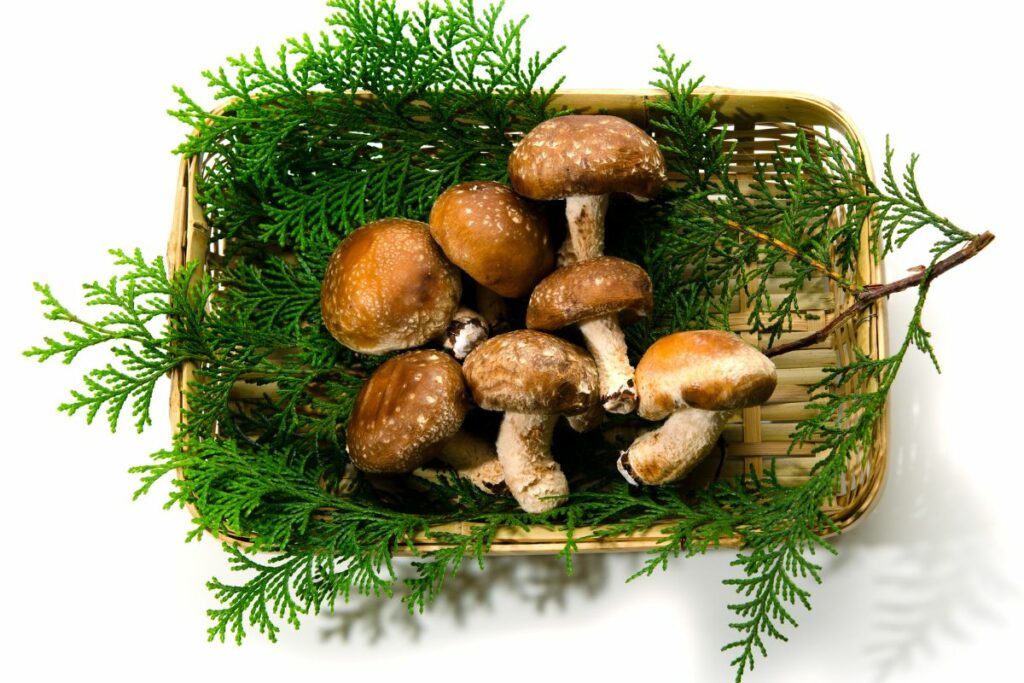
Mushrooms are a versatile ingredient offering numerous health benefits for women. They can be effortlessly added to various dishes, providing an appealing flavor, umami, and savory taste. Integrating mushrooms to salads and other meals not only improves the texture but also enhances the overall nutritional value.
One way to include mushrooms in your diet is incorporating them as a substitute for ground beef. This substitution adds a delicate and savory touch without overpowering the dish. Mixing finely chopped mushrooms with ground beef reduces overall fat intake while maintaining the umami flavor that is typically associated with meat-based dishes. Moreover, mushrooms can help boost the fiber content and lower calorie count – making it a healthier choice for women who want to maintain a balanced and nourishing meal plan.
Adding mushrooms to your salads is also a great option. The earthy flavor and unique texture complement a variety of leafy greens and veggies. Mushroom salads can include both raw and cooked mushrooms, depending on personal preferences. Different types of mushrooms offer varying tastes and benefits, so it’s essential to explore and be adventurous in trying various kinds. Some examples of flavorful combinations include baby spinach with sautéed mushrooms, arugula with marinated mushrooms, and mixed greens with grilled portobello.
Incorporating mushrooms to various dishes doesn’t always have to involve making significant substitutions. Simply adding them to casseroles, stir-fries, sautés, and even grain-based dishes such as risottos and pilafs can elevate the overall flavor and nutrition profile. Mushrooms can also be a fantastic topping for pizzas, sandwiches, and even on their own when roasted or grilled.
In conclusion, women can optimally benefit from mushrooms by including them in their diets – whether it’s by replacing ground beef, enhancing salads, or just adding them to other dishes. With their savory umami flavor and a range of health benefits, mushrooms prove to be a valuable addition to any meal plan.
Frequently Asked Questions
Can mushrooms improve female fertility?
Mushrooms have been known to provide various health benefits, including some related to female fertility. For example, some mushrooms are rich in antioxidants that can help protect the reproductive system and improve overall health. However, while there is evidence pointing towards potential benefits, it’s essential to consult with a healthcare professional before considering mushrooms as part of a fertility-enhancing diet or regimen.
What are the benefits of mushrooms during pregnancy?
In general, mushrooms are nutritious and can be a healthy addition to a diverse diet during pregnancy. They are rich in B vitamins, minerals, and some essential amino acids. They also contain antioxidants and can support a healthy immune system. However, it’s essential to ensure mushrooms are properly cooked, as some raw mushrooms can contain toxic compounds. Pregnant women should consult with their healthcare provider to discuss their personal dietary needs.
Which mushroom is good for menopause symptoms?
Several mushrooms might help alleviate menopausal symptoms. One such example is reishi mushroom; it has a long history in traditional medicine as an adaptogen that promotes relaxation and stress reduction. These effects could potentially help manage symptoms such as mood swings, anxiety, and sleep disturbances in menopausal women. However, it’s crucial to consult a healthcare professional before incorporating reishi mushrooms or other adaptogenic mushrooms into your daily routine or diet.
Do mushrooms have any impact on estrogen levels?
Certain mushrooms, such as reishi and maitake, may have some effect on estrogen levels. These mushrooms contain compounds known as beta-glucans, which may have indirect effects on estrogen production and regulation. However, more research is needed to establish a clear link between mushrooms and estrogen levels definitively, as existing studies are scarce or inconclusive.
What vitamins are present in mushrooms?
Mushrooms are a suitable source of various vitamins, especially B vitamins such as riboflavin (B2), niacin (B3), and pantothenic acid (B5). They also contain trace amounts of vitamin D, which promotes bone health and overall well-being. Other vitamins, such as vitamin C, may be present in smaller amounts depending on the specific mushroom variety.
How do certain mushrooms support women’s health?
Mushrooms offer several potential benefits for women’s health. For example, their rich B vitamin content can support healthy energy production, while antioxidants may help protect cells from oxidative stress, promoting overall health and well-being. Some mushrooms, like reishi, also have adaptogenic properties that may help manage stress and support hormonal balance. It’s important to assess individual health needs and consult with a healthcare professional when considering incorporating mushrooms into a daily diet or wellness strategy.
Footnotes

